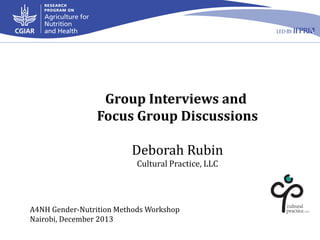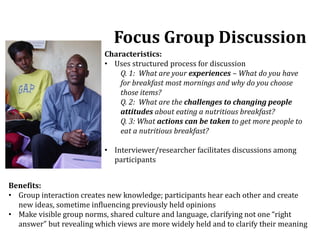Day 1 Session 7 Rubin_fg_ds
- 1. Group Interviews and Focus Group Discussions Deborah Rubin Cultural Practice, LLC A4NH Gender-Nutrition Methods Workshop Nairobi, December 2013
- 2. Is there a difference? Group Interview Focus Group Discussion Purpose: To obtain data from a group of people together on the same topic or topics using a structured questionnaire Purpose: To explore issues and to use group interaction to do so, especially on experiences, attitudes, and opinions Not just âasking people thingsâ!
- 3. Group Interview Characteristics: âĒ Use structured set of questions Q. Who had breakfast this morning? Q. What foods did you eat for breakfast? Q. What beverages did you drink for/with breakfast? âĒ Information flow is primarily one-way, from the interviewees to the interviewer âĒ Interviewer/researcher maintains control and leads interviewees through the topic Benefits: âĒ âĒ Convenience Security
- 4. Focus Group Discussion Characteristics: âĒ Uses structured process for discussion Q. 1: What are your experiences â What do you have for breakfast most mornings and why do you choose those items? Q. 2: What are the challenges to changing people attitudes about eating a nutritious breakfast? Q. 3: What actions can be taken to get more people to eat a nutritious breakfast? âĒ Interviewer/researcher facilitates discussions among participants Benefits: âĒ Group interaction creates new knowledge; participants hear each other and create new ideas, sometime influencing previously held opinions âĒ Make visible group norms, shared culture and language, clarifying not one âright answerâ but revealing which views are more widely held and to clarify their meaning
- 5. Group Selection Purposive sampling: using selection criteria that will reveal differences in the data, e.g., social or demographic dimensions including gender, age, economic level, rural/urban, marital status, with or without children under 5 years of age âĒ Group size âĒ Degree of familiarity âĒ Use of pre-existing groups (e.g., farmer association) âĒ Mixed or same sex
- 6. Challenges âĒ âĒ âĒ âĒ âĒ Getting people to talk â but not too much Overcoming focus group fatigue FGDs need really skilled moderators Managing conflict Managing ethical issues â Chatham house rules â Uncovering abuse
- 7. Paul Baran (1957) once wrote, âwhether or not there is meat in the kitchen is not decided in the kitchen.â Group Interview âĒ Which household members prepared dinner yesterday? âĒ Who decided what to cook? âĒ Which of those food items had been purchased? âĒ Who purchased those foods? âĒ Who provided the money to purchase the food? Focus Group Discussion Experience âĒ Describe who decides what is cooked for dinner at your home. âĒ Describe menâs and womenâs responsibilities for contributing to dinner (who buys the food, who prepares it, who cooks it) âĒ Why is it handled in this way? Challenges/Discussion âĒ Would you like to see any changes in who decides about what is served for dinner? Actions or Resolution âĒ What could you do to change this division of labor?







